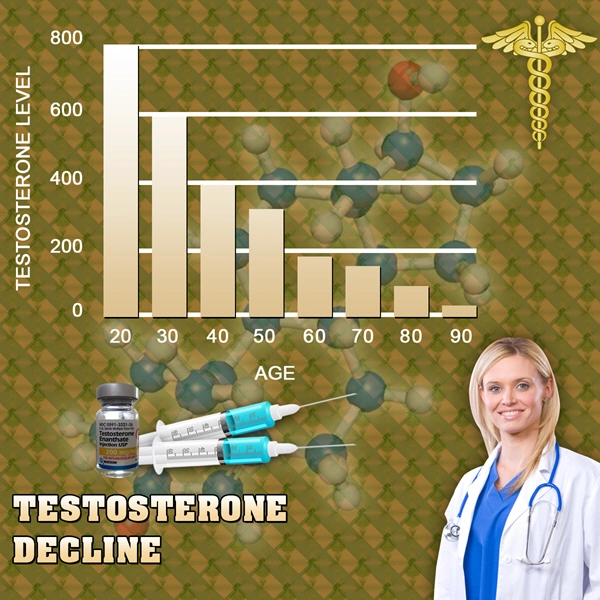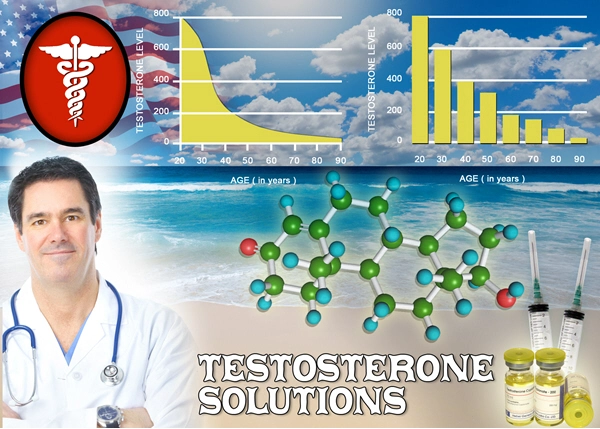Introduction
Late-onset hypogonadism (LOH), characterized by a decline in testosterone levels and associated symptoms in aging men, is a growing concern among American males. Recent research has begun to explore the intricate relationship between dietary patterns and hormonal health, suggesting that nutrition plays a pivotal role in the prevention and management of LOH. This article delves into the current understanding of how dietary choices impact testosterone levels and discusses potential dietary interventions that could benefit American men at risk of or suffering from LOH.
Understanding Late-onset Hypogonadism
Late-onset hypogonadism is a clinical and biochemical syndrome associated with advancing age and characterized by symptoms such as decreased libido, erectile dysfunction, decreased muscle mass, increased body fat, and fatigue, alongside low testosterone levels. The prevalence of LOH is increasing, with significant implications for the quality of life of affected men. While aging is a primary factor, lifestyle and nutritional factors are increasingly recognized as modifiable risk factors.
Dietary Patterns and Testosterone Levels
Emerging evidence suggests that dietary patterns can influence testosterone levels. Diets high in processed foods, sugars, and unhealthy fats are linked to lower testosterone levels and an increased risk of LOH. Conversely, diets rich in nutrients such as zinc, vitamin D, and omega-3 fatty acids are associated with healthier testosterone levels. For instance, zinc, found in foods like oysters, beef, and pumpkin seeds, is crucial for testosterone production. Similarly, vitamin D, which can be obtained from sunlight exposure and foods like fatty fish and fortified dairy products, has been shown to positively affect testosterone levels.
The Role of Macronutrients
The balance of macronutrients—carbohydrates, proteins, and fats—also plays a role in hormonal health. Diets high in simple carbohydrates and sugars can lead to insulin resistance, which in turn can negatively impact testosterone levels. On the other hand, diets that emphasize healthy fats, such as those found in avocados, nuts, and olive oil, and adequate protein intake, particularly from sources like lean meats and legumes, support hormonal balance and overall health.
Potential Dietary Interventions
Given the link between diet and testosterone levels, dietary interventions could be a valuable strategy for managing LOH. A diet that focuses on whole foods, rich in nutrients essential for testosterone production, could be beneficial. For example, incorporating foods high in zinc and vitamin D, reducing intake of processed and high-sugar foods, and maintaining a healthy balance of macronutrients can support hormonal health. Additionally, adopting a Mediterranean diet, which is rich in fruits, vegetables, whole grains, and healthy fats, has been shown to have positive effects on testosterone levels.
Challenges and Considerations
While dietary interventions show promise, implementing such changes can be challenging. Cultural dietary habits, socioeconomic factors, and individual preferences can impact adherence to healthier eating patterns. Moreover, while diet can influence testosterone levels, it is just one piece of the puzzle. Factors such as physical activity, sleep quality, and stress management also play crucial roles in hormonal health and should be considered in a holistic approach to managing LOH.
Conclusion
The relationship between dietary patterns and late-onset hypogonadism in American males highlights the potential for nutritional interventions in managing this condition. By understanding the impact of specific nutrients and dietary patterns on testosterone levels, men can make informed choices to support their hormonal health. As research continues to unravel the complexities of diet and LOH, it is clear that a balanced, nutrient-rich diet is a cornerstone of a comprehensive approach to maintaining optimal testosterone levels and overall well-being.

- Exploring Alternative Therapies for Late-Onset Hypogonadism in Middle-Aged and Older Men [Last Updated On: February 25th, 2025] [Originally Added On: February 25th, 2025]
- Economic Impact of Late-Onset Hypogonadism on U.S. Men's Healthcare [Last Updated On: March 17th, 2025] [Originally Added On: March 17th, 2025]
- Late-Onset Hypogonadism: Impact on Muscle Mass and Management in Aging American Men [Last Updated On: March 18th, 2025] [Originally Added On: March 18th, 2025]
- Genetic Factors in Late-Onset Hypogonadism: Insights for American Males [Last Updated On: March 19th, 2025] [Originally Added On: March 19th, 2025]
- Exploring Late-Onset Hypogonadism: Current Treatments and Future Innovations [Last Updated On: March 20th, 2025] [Originally Added On: March 20th, 2025]
- Late-Onset Hypogonadism: Symptoms, Impacts, and Treatment in American Males [Last Updated On: March 20th, 2025] [Originally Added On: March 20th, 2025]
- Managing Late-Onset Hypogonadism: Symptoms, Lifestyle, and Medical Interventions for American Men [Last Updated On: March 20th, 2025] [Originally Added On: March 20th, 2025]
- Late-Onset Hypogonadism: Effects on Mood, Energy, and Management in American Men [Last Updated On: March 21st, 2025] [Originally Added On: March 21st, 2025]
- Late-Onset Hypogonadism: Understanding, Diagnosing, and Managing Low Testosterone in American Men [Last Updated On: March 21st, 2025] [Originally Added On: March 21st, 2025]
- Nutrition's Role in Managing Late-Onset Hypogonadism in American Males [Last Updated On: March 21st, 2025] [Originally Added On: March 21st, 2025]
- Late-Onset Hypogonadism: Impact on Fertility and Treatment Options for American Men [Last Updated On: March 22nd, 2025] [Originally Added On: March 22nd, 2025]
- Understanding Late-Onset Hypogonadism: Risks and Benefits of Testosterone Therapy [Last Updated On: March 22nd, 2025] [Originally Added On: March 22nd, 2025]
- Early Detection and Management of Late-Onset Hypogonadism in American Males [Last Updated On: March 22nd, 2025] [Originally Added On: March 22nd, 2025]
- Managing Late-Onset Hypogonadism in Aging American Men: Symptoms, Treatment, and Lifestyle [Last Updated On: March 22nd, 2025] [Originally Added On: March 22nd, 2025]
- Exercise as a Key Strategy for Managing Late-Onset Hypogonadism in American Males [Last Updated On: March 23rd, 2025] [Originally Added On: March 23rd, 2025]
- Late-Onset Hypogonadism: Benefits of Early Intervention in American Men [Last Updated On: March 23rd, 2025] [Originally Added On: March 23rd, 2025]
- Late-Onset Hypogonadism: Impacts on Cognitive Function and Therapeutic Approaches [Last Updated On: March 23rd, 2025] [Originally Added On: March 23rd, 2025]
- Managing Late-Onset Hypogonadism: Diagnosis, Treatment, and Lifestyle Strategies for Men Over 40 [Last Updated On: March 23rd, 2025] [Originally Added On: March 23rd, 2025]
- Exploring the Link Between Late-Onset Hypogonadism and Diabetes in American Males [Last Updated On: March 23rd, 2025] [Originally Added On: March 23rd, 2025]
- Managing Late-Onset Hypogonadism: Impacts, Diagnosis, and Treatment in American Men [Last Updated On: March 23rd, 2025] [Originally Added On: March 23rd, 2025]
- Dietary Strategies to Manage Late-Onset Hypogonadism in American Men [Last Updated On: March 23rd, 2025] [Originally Added On: March 23rd, 2025]
- Managing Late-Onset Hypogonadism: Symptoms, Treatment, and Societal Impact on American Men [Last Updated On: March 24th, 2025] [Originally Added On: March 24th, 2025]
- Emotional Journey of Late-Onset Hypogonadism in American Men: Coping and Support [Last Updated On: March 24th, 2025] [Originally Added On: March 24th, 2025]
- Managing Late-Onset Hypogonadism: Symptoms, Diagnosis, and Treatment Options for American Men [Last Updated On: March 24th, 2025] [Originally Added On: March 24th, 2025]
- Late-Onset Hypogonadism: Effects on Health and Importance of Early Intervention [Last Updated On: March 24th, 2025] [Originally Added On: March 24th, 2025]
- Late-Onset Hypogonadism: Enhancing Patient Education and Screening in the US [Last Updated On: March 24th, 2025] [Originally Added On: March 24th, 2025]
- Late-Onset Hypogonadism: Symptoms, Risks, and Management Strategies for Aging Men [Last Updated On: March 24th, 2025] [Originally Added On: March 24th, 2025]
- Late-Onset Hypogonadism: Prevalence, Stigma, and Treatment in American Men [Last Updated On: March 24th, 2025] [Originally Added On: March 24th, 2025]
- Managing Late-Onset Hypogonadism: Holistic Approaches for American Males [Last Updated On: March 24th, 2025] [Originally Added On: March 24th, 2025]
- Late-Onset Hypogonadism: Symptoms, HRT Benefits, and Safety in American Men [Last Updated On: March 25th, 2025] [Originally Added On: March 25th, 2025]
- Advocating for Better Late-Onset Hypogonadism Care: A Call to American Men [Last Updated On: March 25th, 2025] [Originally Added On: March 25th, 2025]
- Late-Onset Hypogonadism: Myths, Facts, and Management Strategies for American Men [Last Updated On: March 25th, 2025] [Originally Added On: March 25th, 2025]
- Late-Onset Hypogonadism: Impact on Sleep and Management Strategies for American Men [Last Updated On: March 25th, 2025] [Originally Added On: March 25th, 2025]
- Late-Onset Hypogonadism in American Males: Diagnosis, Management, and Multidisciplinary Care [Last Updated On: March 26th, 2025] [Originally Added On: March 26th, 2025]
- Stress and Late-Onset Hypogonadism: Impact on American Males' Hormonal Health [Last Updated On: March 26th, 2025] [Originally Added On: March 26th, 2025]
- Late-Onset Hypogonadism: Impacts on American Men's Careers and Workplace Strategies [Last Updated On: March 26th, 2025] [Originally Added On: March 26th, 2025]
- Late-Onset Hypogonadism in Aging American Men: Symptoms, Risks, and Management Strategies [Last Updated On: March 26th, 2025] [Originally Added On: March 26th, 2025]
- Late-Onset Hypogonadism in Aging American Men: Symptoms, Risks, and Management Strategies [Last Updated On: March 26th, 2025] [Originally Added On: March 26th, 2025]
- Late-Onset Hypogonadism: Impact on American Males and the Vital Role of Family Support [Last Updated On: March 26th, 2025] [Originally Added On: March 26th, 2025]
- Late-Onset Hypogonadism: Effects on American Men's Relationships and Management Strategies [Last Updated On: March 26th, 2025] [Originally Added On: March 26th, 2025]
- Financial Impact of Late-Onset Hypogonadism on American Men: Costs and Strategies [Last Updated On: March 27th, 2025] [Originally Added On: March 27th, 2025]
- Innovative Technologies Revolutionizing Late-Onset Hypogonadism Diagnosis in American Males [Last Updated On: March 27th, 2025] [Originally Added On: March 27th, 2025]
- Cultural Perceptions and Management of Late-Onset Hypogonadism in American Men [Last Updated On: March 27th, 2025] [Originally Added On: March 27th, 2025]
- Legal Aspects of Late-Onset Hypogonadism: Diagnosis, Treatment, and Rights in the U.S. [Last Updated On: March 27th, 2025] [Originally Added On: March 27th, 2025]
- Late-Onset Hypogonadism: Diagnosis, Treatments, and Lifestyle Management for American Men [Last Updated On: March 27th, 2025] [Originally Added On: March 27th, 2025]
- Diagnosing Late-Onset Hypogonadism: A Guide for American Males [Last Updated On: March 27th, 2025] [Originally Added On: March 27th, 2025]
- Managing Late-Onset Hypogonadism: Strategies for Maintaining Independence in American Men [Last Updated On: March 27th, 2025] [Originally Added On: March 27th, 2025]
- Late-Onset Hypogonadism in American Males: Prevalence, Monitoring, and Management Strategies [Last Updated On: March 28th, 2025] [Originally Added On: March 28th, 2025]
- Mental Health Professionals' Vital Role in Managing Late-Onset Hypogonadism in Aging Males [Last Updated On: March 28th, 2025] [Originally Added On: March 28th, 2025]
- Late-Onset Hypogonadism: Community Support and Management Strategies for Aging American Males [Last Updated On: March 28th, 2025] [Originally Added On: March 28th, 2025]
- Managing Late-Onset Hypogonadism in Aging American Men: Symptoms, Diagnosis, and Treatment [Last Updated On: March 29th, 2025] [Originally Added On: March 29th, 2025]
- Late-Onset Hypogonadism: Diagnosis Journey and Management for American Men [Last Updated On: March 29th, 2025] [Originally Added On: March 29th, 2025]
- Managing Late-Onset Hypogonadism: Diet, Exercise, Sleep, and Lifestyle Strategies for American Men [Last Updated On: April 1st, 2025] [Originally Added On: April 1st, 2025]
- Late-Onset Hypogonadism: Impact on Self-Esteem and Management Strategies for American Men [Last Updated On: April 1st, 2025] [Originally Added On: April 1st, 2025]
- Navigating Insurance Coverage for Late-Onset Hypogonadism Treatment in American Men [Last Updated On: April 2nd, 2025] [Originally Added On: April 2nd, 2025]
- Managing Late-Onset Hypogonadism: The Vital Role of Peer Support for American Males [Last Updated On: April 4th, 2025] [Originally Added On: April 4th, 2025]
- Research Advances in Late-Onset Hypogonadism: Diagnosis, Treatment, and Future Directions in the US [Last Updated On: April 6th, 2025] [Originally Added On: April 6th, 2025]
- Late-Onset Hypogonadism: Symptoms, Social Impact, and Management Strategies for American Men [Last Updated On: April 6th, 2025] [Originally Added On: April 6th, 2025]
- Managing Late-Onset Hypogonadism: Stress Reduction Strategies for American Men [Last Updated On: April 7th, 2025] [Originally Added On: April 7th, 2025]
- Patient Advocacy's Crucial Role in Managing Late-Onset Hypogonadism in American Men [Last Updated On: April 9th, 2025] [Originally Added On: April 9th, 2025]
- Late-Onset Hypogonadism: Symptoms, Diagnosis, and Management in American Males [Last Updated On: April 9th, 2025] [Originally Added On: April 9th, 2025]
- Managing Late-Onset Hypogonadism: A Holistic Approach for American Men's Mental Health [Last Updated On: April 9th, 2025] [Originally Added On: April 9th, 2025]
- Late-Onset Hypogonadism: Impact, Diagnosis, and Management in American Males [Last Updated On: April 11th, 2025] [Originally Added On: April 11th, 2025]
- Exploring the Emotional Impact of Late-Onset Hypogonadism in American Men [Last Updated On: April 11th, 2025] [Originally Added On: April 11th, 2025]
- Managing Late-Onset Hypogonadism: Symptoms, Diagnosis, and Treatment Options for American Men [Last Updated On: April 11th, 2025] [Originally Added On: April 11th, 2025]
- Understanding Late-Onset Hypogonadism: Symptoms, Detection, and Holistic Management in American Men [Last Updated On: April 12th, 2025] [Originally Added On: April 12th, 2025]
- Nutritionists' Role in Managing Late-Onset Hypogonadism in American Males [Last Updated On: April 12th, 2025] [Originally Added On: April 12th, 2025]
- Exercise as a Non-Pharmacological Approach to Managing Late-Onset Hypogonadism in American Men [Last Updated On: April 13th, 2025] [Originally Added On: April 13th, 2025]
- Endocrinologists' Vital Role in Managing Late-Onset Hypogonadism in American Men [Last Updated On: April 15th, 2025] [Originally Added On: April 15th, 2025]
- Late-Onset Hypogonadism: Impact on Sexual Function and Management Strategies in American Men [Last Updated On: April 15th, 2025] [Originally Added On: April 15th, 2025]
- Understanding and Managing Late-Onset Hypogonadism in American Males [Last Updated On: April 15th, 2025] [Originally Added On: April 15th, 2025]
- Understanding Late-Onset Hypogonadism: Symptoms, Diagnosis, and Treatment Advances [Last Updated On: April 16th, 2025] [Originally Added On: April 16th, 2025]
- Therapists' Vital Role in Managing Late-Onset Hypogonadism in Aging American Men [Last Updated On: April 17th, 2025] [Originally Added On: April 17th, 2025]
- Holistic Management of Late-Onset Hypogonadism in American Men [Last Updated On: April 17th, 2025] [Originally Added On: April 17th, 2025]
- Late-Onset Hypogonadism in American Men: Diagnosis, Treatment, and Lifestyle Management [Last Updated On: April 18th, 2025] [Originally Added On: April 18th, 2025]
- Late-Onset Hypogonadism: Impact and Management in American Men's Professional Lives [Last Updated On: April 19th, 2025] [Originally Added On: April 19th, 2025]
- Managing Late-Onset Hypogonadism: Lifestyle Strategies for American Men's Health [Last Updated On: April 20th, 2025] [Originally Added On: April 20th, 2025]
- Managing Late-Onset Hypogonadism: Leveraging Community Resources for American Men's Health [Last Updated On: April 20th, 2025] [Originally Added On: April 20th, 2025]
- Late-Onset Hypogonadism: Symptoms, Risks, and Management in American Men [Last Updated On: April 21st, 2025] [Originally Added On: April 21st, 2025]
- Diagnosing Late-Onset Hypogonadism in American Men: Symptoms, Challenges, and Strategies [Last Updated On: April 22nd, 2025] [Originally Added On: April 22nd, 2025]



List of USA state clinics - click a flag below for blood testing clinics.
Word Count: 574


















































